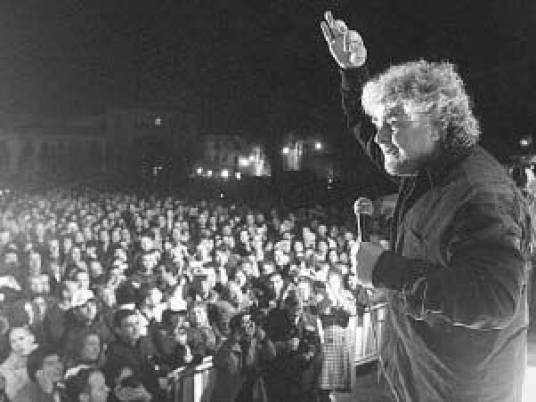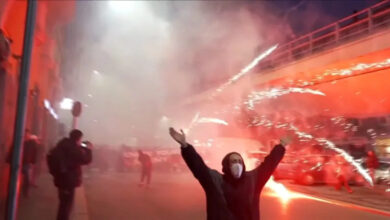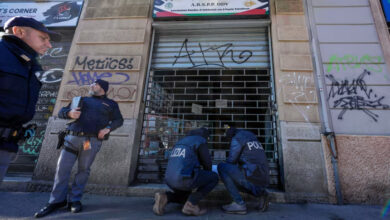
Italy went through a tumultuous poll this week amid politicians’ banking scandals, the pope stepping down, the revival of former Prime Minister Silvio Berlusconi’s political career, and former President Mario Monti’s choice to run for the post after months of firm denial of any such intention.
The center-left coalition led by Pierluigi Bersani won the Chamber of Deputies of the bicameral parliament, where laws must first be passed before moving on to the Senate, with 29.5 percent of the votes.
Berlusconi’s center-right coalition won 30.7 percent of the votes for the Senate, which brought the coalition 117 seats — only three less than Bersani’s coalition.
With no majority victory in both houses of parliament, passing laws becomes a challenge for both coalitions.
Meanwhile, like a tsunami, famous comedian Beppe Grillo’s Five Star Movement swept away competitors, becoming the first political force running outside a coalition in the Chamber of Deputies, and winning 25.5 percent of the votes. The results suggest a new third way in Italy’s traditional center-right/center-left binary.
Ahead of the polls, Grillo’s electoral tour had been taking over Italy’s squares one by one, with three speeches a day and tens of thousands of YouTube hits. Last week, in Milan’s Piazza del Duomo, thousands gathered to hear Grillo’s political show, where literature Nobel Prize laureate Dario Fo enthusiastically declared on stage, “It’s like at the end of World War II, when there was a lot of joy among people who wanted to see change and build a new society.”
Mainstream politicians often referred to the movement as “anti-politics.” While both left and right-wing parties generally disregarded it as irrelevant, after its strong electoral performance, they increasingly slam it as a danger to democracy. The media largely dismissed the movement, mentioning it only in reference to Grillo’s famous stunts.
But for its sympathizers, the movement provides an appealing alternative political model.
The Five Star Movement has been growing exponentially since it began in 2006 as an online community based around Grillo’s blog, the most popular in Italy, as well as social networks. Sympathizers later organized meet-ups to discuss issues ranging from green economics and technology to local development, economic sovereignty and access to knowledge.
In 2007, Grillo organized the first V-day, standing both for the Italian swear word “vaffanculo,” and vendetta. He also launched the “Clean Parliament” initiative to ban politicians with criminal records from being elected.
He collected more than 350,000 signatures in one day. Nevertheless, the initiative was not discussed in parliament.
In 2009, the Five Star Movement launched its political platform around five public priorities: access to water, a sustainable transportation system, connectivity, local development and environmental protection. In 2010, the decision to participate in electoral politics and run as independents for local councils yielded remarkable results in several cities.
For example, the movement’s candidate won the mayoral seat in the important city of Parma in 2012.
Today, its key points are oriented toward issues of social justice and equality, such as a living wage for the unemployed, free Internet, opposing the privatization of water and basic services, and limiting and monitoring war and military expenditure. It also includes fiscal benefits for social enterprises to improve the stagnating economy.
Analysts say the movement’s rise has absorbed those who had grown increasingly disenchanted by the failure of democratic institutions, and who would have otherwise opted for more radical choices, such as the extreme right.
Members describe it as a viable alternative to Berlusconi’s controversial right-wing politics and the left, criticized for making compromises to avoid losing political perks, such as high wages and retirement bonuses. They believe the movement is finally tackling the political ills long ignored by the prevalent forces, particularly political parties and mainstream media.
“If Italy was a normal country, the Five Star Movement wouldn’t exist,” says Dafni Ruscetta, an activist from Cagliari. “The failure of the current political and economic model is due to corruption, a consolidated system of lobbies and clientelism. The mafia is not simply crime and godfathers, but rather a mentality rooted in our culture.”
Paola Pinna, a candidate for the lower house, says the movement is looking for inspiration in other movements worldwide.
“We don’t follow existing models, but of course we have looked at civil society movements here and abroad, and we share with them a bottom-up approach and a strong motivation to take part in politics directly,” Pinna says. “So Grillo represents a lifeline — a last chance to show the political class that the people will not accept that it operates in the public interest.”
Crowds roaring “Let’s send them all back home,” or “Surrender, you have been surrounded,” addressing mainstream politicians, are a common sight at Grillo’s gatherings. But as much as it is celebrated as a new stream of politics, some are skeptical about a certain self-righteousness within the movement.
“One of the critical and potentially dangerous attitudes of Grillo’s supporters is their assumption that they’re voicing the ‘real needs’ of society, accusing those who do not understand or support the movement’s battles of being naive and ill-informed,” says Enrico De Angelis, a researcher in political communication and new media.
The movement is also often criticized for the inexperience of its candidates, many of them new to politics. But the group precisely tries to promote the idea that politics belong to everyone.
“If you accept the principle that one is worth one, like our Constitution says, you have to accept that theoretically everybody can run for politics, not only renowned professors, lawyers, doctors, or the alleged experts and showgirls that live completely disconnected from reality,” Ruscetta says. “We want citizens who have had nothing to do with politics so far, so they can better represent the majority of Italians.”
Movement members say this is their chance to contribute their knowledge.
“I studied economic laws concerning balancing public budgets and I realized nobody has been taking them into account,” Laura Castelli, a 26-year old candidate in the Piedmont region, says. “This is what I can do, and I want to contribute my experience to governing my region. The administration of public affairs must be efficient.”
Grillo himself often refers to the movement as “an army of citizens with the helmet,” and admits he is unable to lead it. “We cannot keep delegating politics to others. We have to do it collectively, as citizens are the ones who know their country and its problems,” he has said.
With this in mind, the movement is striving to return some trust in the political process.
Federico Pizzarotti, Parma’s mayor, who was elected with the movement, says that voters are much more demanding now the movement is in power, “even though nobody ever cared about the experience and capability of politicians.”
“Despite their fame and their CVs, politicians have brought us to the disaster we are in now. So not being experienced is a guarantee,” he says.
But Angelis describes a danger in the movement’s discourse of “externalizing conflicts.” While Grillo successfully mobilized public anger, Angelis says, the problem is that he is fixated on a message that “all the problems we are facing now are others’ faults, not ours.”
This makes it less solution-oriented, he says. “It is an excessive simplification of very complex issues, which is typical of the Internet and social networks, where he who shouts louder gets more attention and more weight.”
But the movement has detailed several propositions — particularly in response to what they describe as rampant corruption.
“First of all, we are going to take back all the money that has been stolen by the political caste that costs billions of euros per year. That’s a start,” Grillo said during one of his public gatherings.
“Politics is not done with public money to buy billboards,” he continued. “Politics is done among the people, in the squares. Politicians appear in public surrounded by bodyguards and police, their opponents stopped and questioned. You are my bodyguards, the citizens.”
The movement also firmly refuses to rake in any public funding for its political activity, relying on volunteers and donations instead. For its elections campaign, it collected more than 500,000 euros from 20,000 small donors.
After the movement’s success in regional elections, it immediately gave back 1.7 million euros of public funding, and implemented a 70 percent reduction on salaries to be allocated to micro credit initiatives for startups.
Critics also say the movement is heavily based on the charisma of Grillo alone. Meanwhile, cynics say it is dangerous to call it a bottom-up civil society movement speaking on behalf of the people, but rather a powerful organization relying on the best tools and expertise in the fields of technology and networking.
The movement’s unexpected success poses a challenge, as it will have to negotiate with a largely conservative political and economic system. It claims a plan to destabilize the political establishment by introducing new practices involving the permanent control and monitoring of institutions.
“If I get elected, I will go every day to parliament with a webcam around my neck,” Castelli promised, in an interview prior to the polls.
It’s another version of Grillo’s famous slogan, “We will open the parliament like a tuna can.”




